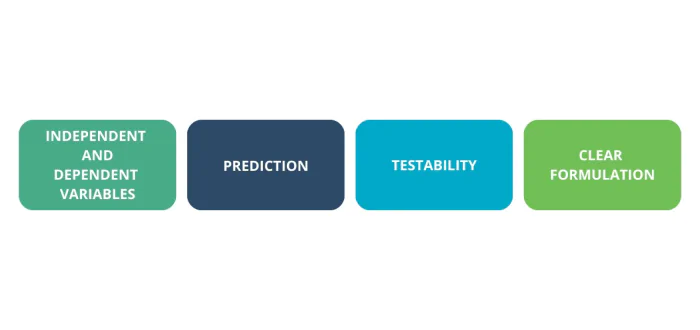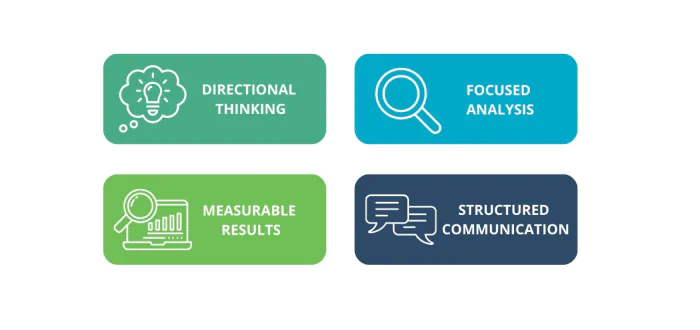In the field of consulting, the hypothesis plays a central role in the analysis of problems, the development of solutions and the derivation of strategic recommendations. A hypothesis is a preliminary assumption or conjecture made on the basis of existing information and data. It serves as a starting point for investigations to gain empirically verifiable knowledge. This article explores the meaning, purpose, and application of hypotheses in the consulting context.
The Importance of a Hypothesis in Consulting
In the world of consulting, where complex business issues must be solved, the hypothesis is a fundamental component in developing structured approaches to solving them. A hypothesis allows consultants to sort through their thoughts and focus specifically on certain aspects of an issue. It also serves as a guideline to direct and guide the research process as data are collected and analyzed.
The hypothesis also functions as an "educated guess" or informed conjecture based on existing knowledge, experience, and market insights. It helps structure the advisory process and guide efforts in the right direction.
Components of a Hypothesis
A well-formulated hypothesis consists of several essential components:

- Independent and Dependent Variables:
The hypothesis defines the relationship between an independent (manipulated) variable and a dependent (measured) variable. The independent variable is the one that is purposefully changed in an experiment, while the dependent variable is the response that is measured. - Prediction:
The hypothesis contains a clear prediction about how the change in the independent variable will affect the dependent variable. This prediction is what is tested in the experiment. - Testability:
A hypothesis must be testable, meaning that it can be tested by experimental investigation. It should be formulated in such a way that its correctness or incorrectness can be determined from observations and data. - Clear Formulation:
the hypothesis should be precise and clearly formulated to avoid misunderstandings. Clear wording also facilitates communication of the results.
The Purpose of a Hypothesis in Consulting
Formulating a hypothesis serves several important purposes in consulting:

- Directional Thinking:
A hypothesis forces consultants to think about possible causes and relationships that may have led to a problem. It promotes structured thinking and prevents aimless poking around in problem-solving. - Focused Analysis:
Hypotheses help focus the investigation on relevant data and information. This prevents an overload of unimportant details and allows for an in-depth analysis of the aspects that are most likely to have an impact. - Measurable Results:
A clear hypothesis makes it possible to establish concrete criteria for the success or failure of an investigation. This creates a basis for evaluating the effectiveness of proposed solutions. - Structured Communication:
A precisely formulated hypothesis facilitates communication between consultants and clients. It enables the planned steps, methods and expected results to be communicated in an understandable way.
The Application of Hypotheses in Consulting
The use of hypotheses in consulting spans several key phases of the consulting process and contributes significantly to structuring and finding solutions. In the problem identification phase, hypotheses help identify potential causes and influencing factors of a business problem by serving as a starting point for in-depth investigations.
During data collection and analysis, hypotheses act as a guide to extract targeted relevant information, enabling more precise and focused data analysis.
In the solution development phase, hypotheses play an important role in the evaluation and selection of different solution approaches. By serving as criteria to assess the probability of success of different options, they contribute to the development of the most promising solutions. Finally, hypotheses enable strategic recommendations to be derived. They provide a sound basis for formulating persuasive arguments in favor of particular strategies and for convincing clients of the soundness of proposed actions.
Overall, the application of hypotheses functions as a systematic approach in consulting to bring structure to complex issues, perform targeted analyses, and ultimately derive informed decisions. This approach promotes the efficiency and effectiveness of the consulting process and ensures that the solutions developed are based on sound and validated assumptions.
Conclusion
The hypothesis is an essential tool in consulting that helps structure complex problems, conduct targeted analyses, and derive informed solutions. It promotes a structured and focused approach and plays a crucial role in communicating ideas and recommendations to clients. In an industry based on informed decision-making, hypothesis is a powerful tool to influence the success of consulting projects.


